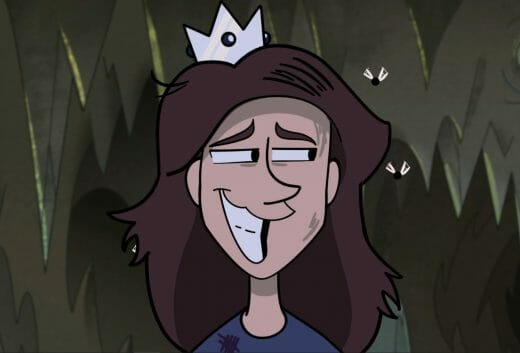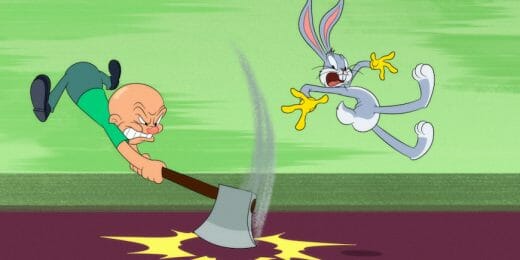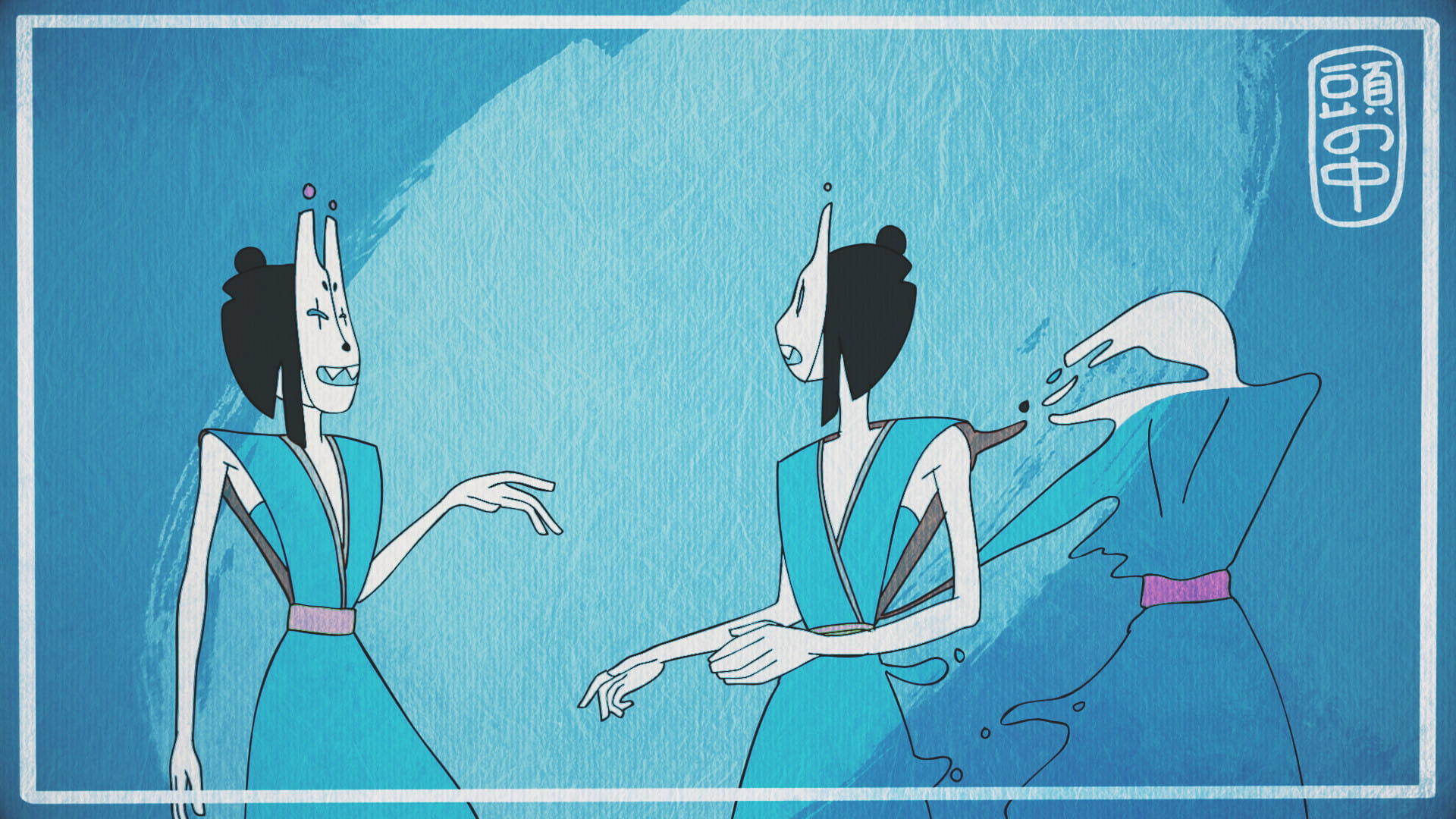
True Colours is a striking thesis film which confronts the idea of personality, and how the self doesn’t always feel like one cohesive whole. This was a feeling that the team behind the film experienced at University; with the pressures this could put on time, relationships, and sense of who they were.
A beautifully stylistic piece, the characters and forms evoke fashion silhouette sketches and Japanese Ukiyo-e wood prints; from protagonist Nezumi to her otherworldly alter-ego Aoi. The film represents its creators, their style, and their emotional journeys, with each artist leaving a fingerprint on the finished piece. Animated using Toon Boom Harmony, the making of True Colours is a story of collaboration, companionship and great teamwork.
We spoke with Toon Boom Ambassador Hanna Lea Wyttenbach; motion designer, character animator, and the director behind True Colours. Hanna was generous enough to discuss her process, and some tips and techniques that went into the short.
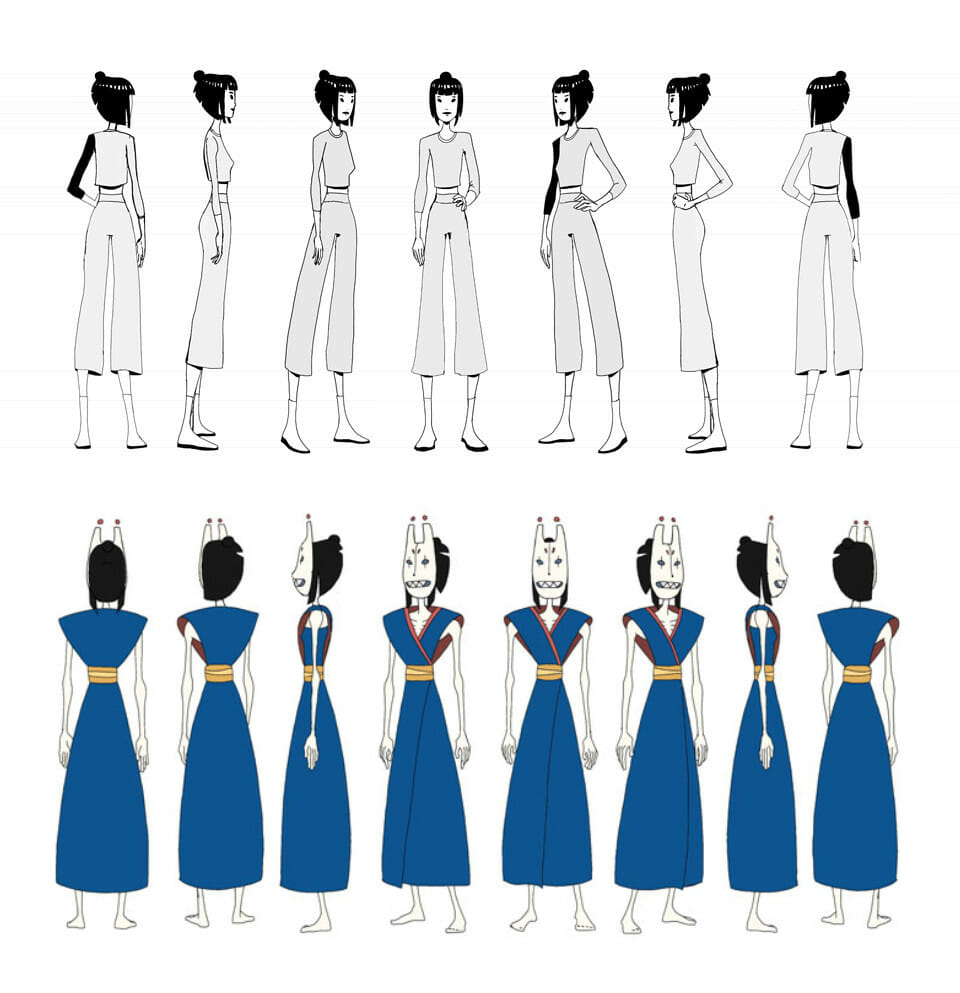
Hi Hanna Lea! Congratulations on True Colours’ nomination in the British Art Awards! What has the reception to True Colours been like?
Hanna Lea: Hi Edward, thank you so much for this interview! It’s honestly been one of the most surprising aspects of this entire journey. Since this all happened during the start of the pandemic, our only goal was to finish this project somehow. Being invited to so many festivals, being nominated, and even being awarded was definitely far away from anything we dreamed of. It was a true honour to receive such positive feedback. And it definitely gave us a boost of confidence that our work somehow matters and can go a long way when it comes from the heart.
Please introduce the True Colours team members and their roles on the project…
Hanna Lea: There’s Phoebe White, my emotional pillar, producer, storyboard artist and animator. We have Ellen Huang, comedian, concept artist, storyboard artist and animator. Wenhao Song, concept artist and layout artist; Jade Dou Hua Gordon as character designer and animator; Anna von Koelichen as concept artist and animator.
And me as director, mom of the group, co-producer, character designer and lead animator.
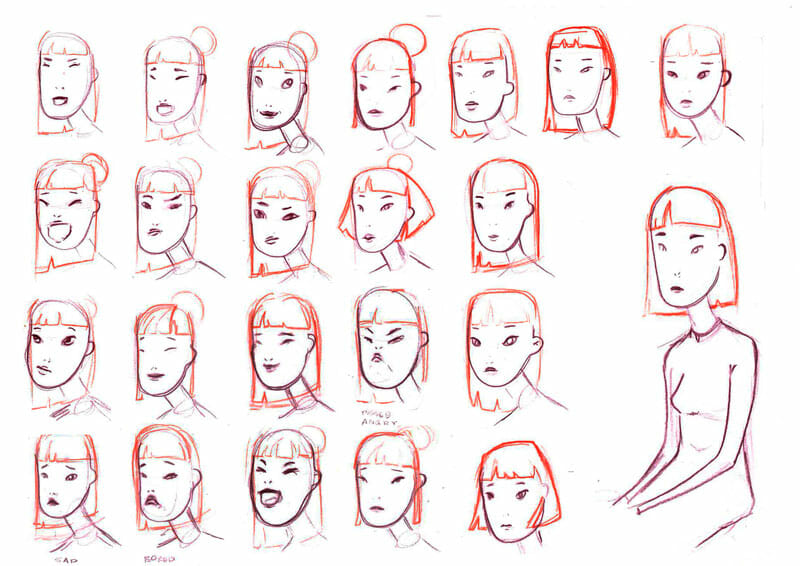
In your words, what is True Colours about?
Hanna Lea: Objectively it is about a girl meeting a long lost friend, catching up and questioning the genuineness of their friendship. But personally I think it is also about not speaking up for yourself, and trying to fit in by holding back your emotions. But someone else once said it is about imposter syndrome, which I found such an interesting view!
Phoebe: Hearing the idea for True Colours when we began to pitch it brought me back to the beginning of University. Where I knew this is 100% where I wanted to be and what I wanted to be studying. But feeling very unworthy and disconnected to the ideas of University that everyone was having around me. Where there’s this ideal idea of University life and the beginning of a new chapter.
I couldn’t help feeling that my true feelings — of being a little lost and not up for the creativity required to be in the animation industry — kind of clouded that first year. Until I found the courage to talk about it with a few people and realized I wasn’t alone in that. True Colours’ idea is so important to talk about; we all can relate in one way or another to not being able to communicate our true feelings.
How would you describe your storyboarding process?
Hanna Lea: When we first came together, we scrapped my initial pitch storyboard and mainly focused on the key message which evolved around a meeting between two people and the question: “How have you been?” From that, we pitched ideas on how this meeting could unfold so that there is an emotional build up until there is this explosion right before the conclusion.
We drew our initial thumbnail ideas on sticky notes and pinned them onto a pin wall. After that, we went digital and created the cleaner and final boards within Storyboard Pro. I really loved how Storyboard Pro labels the panels automatically when you add new panels in-between others. It really saved us many hours of tedious panel naming and allowed us to focus on the task.
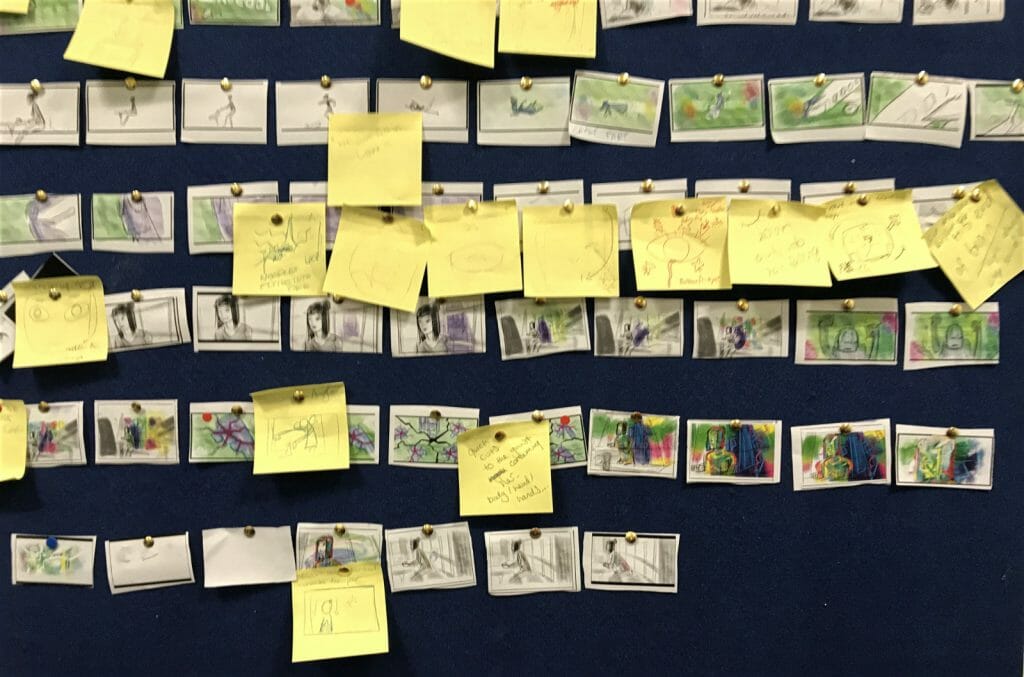
What was your process of collaboration on the project?
Hanna Lea: It was chaotic from start to end! Just joking.
I was so lucky to have such a great group of wonderful artists. It was of utmost importance to me that this film will be a product of each of our art styles and not just a product of my own vision. That’s why, when we started with pre-production, we threw away a lot of the design and story choices that were in my pitch. We created something that still had the same core message but a different delivery.
We had so many great moments and fun days that the bad days are insignificant in hindsight. Our communications were something I cherished the most and probably the reason why we keep in touch still.
How would you describe the animation techniques used in your film, and your approach to the different scenes?
Hanna Lea: It’s a mixture of digitally hand-drawn animation and computer generated effects. The approach for each scene was the same. First we blocked them out, then we added in-betweens. Once the animation worked, we drew the clean lines on top of each frame. Also, we filmed ourselves for reference before we started a shot.
We produced all the character animation and colouring in Toon Boom Harmony. To me, there wasn’t another option.
What was the inspiration and process of character design of the lead protagonist?
Hanna Lea: I don’t want to say that the character design of Nezumi is based off myself, but the concept for the character Nezumi stems off an experience I had a couple years back coupled with the emotions of that experience. As for the design, I wanted to create someone who is confident, well-mannered, elegant; yet filled with childish doubts.
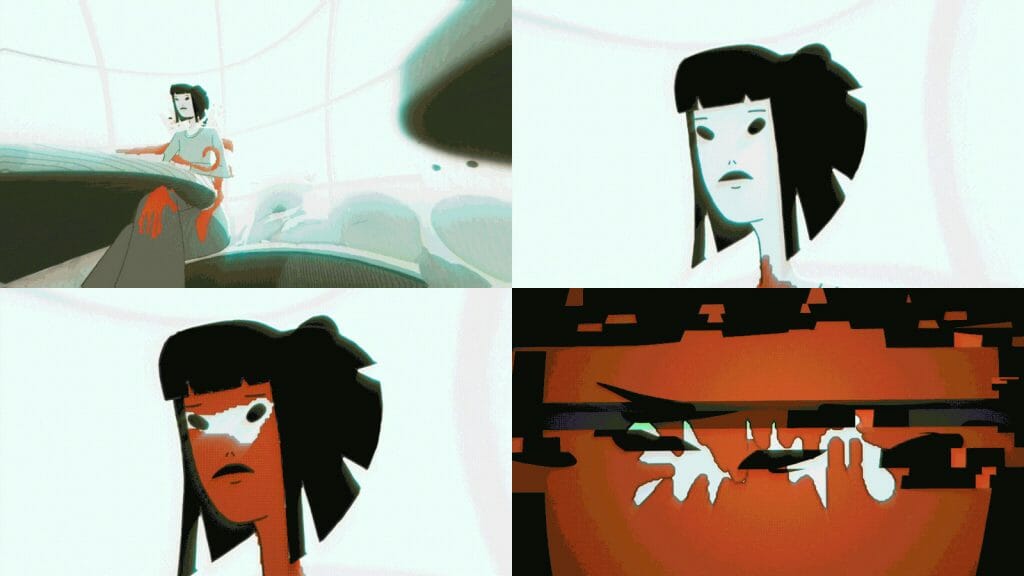
There is a great variety of texture on show during her episodes. How was this effect created?
Hanna Lea: We wanted the scenes with her ‘true self,’ named Aoi, to be like a Japanese woodprint. We did a lot of experimenting with effects for the woodprint look in After Effects to achieve the texture. We mainly used After Effects for post-production, but I composited some of the lighting effects in the node view in Harmony with normal mapping and light sources.
What does her transformations represent? Is this a representation of her mental health?
Hanna Lea: Yes. Partly they represent her mental state, but they also represent her different personas; her memories, or at least her interpretation of these memories, just like in the scene when Aoi splits into three. These are representative of her two friends as she remembers them. I hope this makes sense.
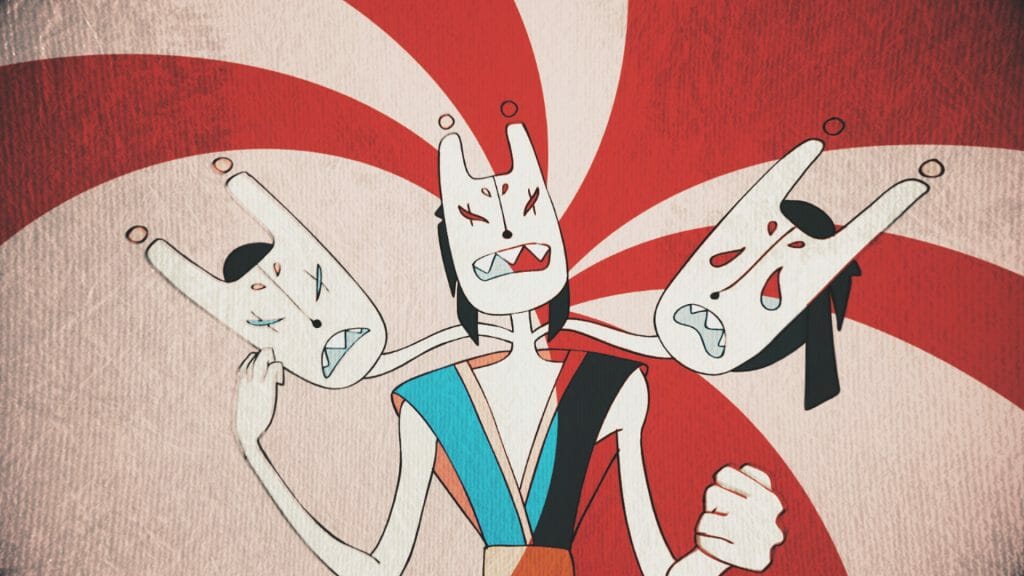
What was the biggest challenge for you during the production of True Colours and what are you the most proud of?
Hanna Lea: The most obvious and biggest challenge was when we all went home from University during the pandemic. As we all live, not just in different cities, but also different countries, it was quite a challenge to stay motivated and keep everything going. But I am so proud of my team’s perseverance! No one was prepared for this situation and even finishing this project felt like a miracle.
Do you have plans to make further shorts with this team?
Hanna Lea: I would love to! But we all are busy bees living our own lives now. It’s quite a challenge as we all live in different countries. And I wouldn’t dare to create something in this style by myself, as it has each team member’s fingerprint in it. But who knows…
Do you have advice for students working on thesis films of their own?
Hanna Lea: Be brave and show the world what goes on in your head! Be brutally honest and enjoy the ride. Include everyone in your team and be prepared for a stressful yet joyful ride. If it is your idea that makes the cut, make sure it becomes the team’s idea once production starts.
It is probably one of the only times where you get the chance to have this much artistic freedom, so do it to your heart’s content!
- Interested in seeing more of True Colours? You can find behind-the-scenes images and clips on Hanna Lea’s website.
- Ready to animate your next project in Toon Boom Harmony? Download a 21-day trial.


